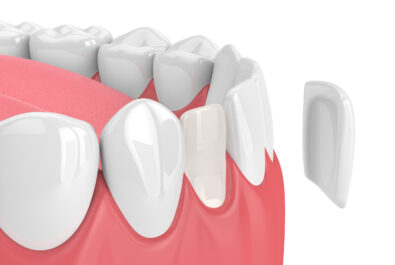With all the attention you pay to your teeth, you might expect to notice if something is wrong with your dental health. If your teeth don’t hurt, and they still retain their pearly-white, blemish-free appearance, then you could assume they were in excellent health. Unfortunately, that assumption may be wrong, especially if you miss the signs of gum disease. As the seal that protects your teeth roots from irritants and infections, your gums are vital to maintaining a healthy smile, and when they’re diseased, your teeth might not give you ample warning. (more…)
What Are The Steps For Dental Implants?
You are not happy with the way your teeth and your smile look. You may have a missing tooth or may have lost several teeth in an accident or from periodontal disease. What you know is that you do not look your absolute best. So, you begin to look for alternatives. One of those alternatives is dental implants. Your interest has been piqued and you are now interested in learning about the various stages of the dental implant stages. (more…)
An Overview Of Dental Implants
It may seem that everywhere you go lately, you hear about dental implants. Friends and family likely had successful dental implant surgery. You may have even heard them mentioned the last time you had your dental procedure with Dr. Shawn Hofkes. You, however, may want a general overview of the procedure, and find out if it is a good fit for you. The questions and answers below should be helpful.
Q: What Is A Dental Implant?
A: Dental implants are prosthetic replacements for missing teeth. Specifically, there are three parts of an implant. The first part is the device implanted directly into the jawbone called the “implant post.” Second, the “abutment” is what connects the implant post to the artificial teeth. The third component is the crown or dental bridge, which is what you actually see above the gum line. (more…)
Why Some Teeth Must Be Extracted
It is the goal of a good dentist, such as Dr. Shawn Hofkes of Cerritos Dental Surgery, to try and save each and every tooth. Although adult permanent teeth were designed to last a lifetime, sometimes, saving a tooth is not possible or even desirable, and it may need to be extracted.
The Need for Tooth Extraction
There are a variety of reasons why a tooth may need to be removed:
- Your mouth may be too crowded. If you are about to begin an orthodontic procedure, it may be necessary to remove a tooth or teeth to properly align your teeth.
- Your tooth may be infected. Often, the pulp of a tooth has been damaged, where the nerves and the blood vessels are housed. If this is the case, and antibiotics have failed or the damage has progressed too far, then the only option may be extraction.
Keeping Your New Smile Bright
You have just made a very good decision and decided to have your teeth whitened. You love your new look, and your smile has not been this dazzling in years. Wherever you go, people are commenting not only on your smile, but also that you seem to look younger and more vibrant.
So how do you maintain your teeth’s sparkling new appearance?
Avoid staining beverages, if possible
One of the main causes of teeth yellowing is coffee, tea, cola soft drinks, and red wine. Changing your drinking habits to include more water and fewer harmful beverages will go a long way towards maintaining your bright smile.
If you do not want to forgo your latte, or chia tea, or glass of red wine, consider using a straw. This will help considerably minimize your teeth’s exposure to the stain-inducing beverages.
Also, follow your staining beverage with a glass of water, which will immediately reduce the staining impact. (more…)
How and Why to Look for Oral Cancer
In the public eye, cancer is most commonly associated with the breasts, lungs, skin, prostate, and other body organs. However, oral cancer is one of the most prevalent and dangerous, affecting approximately 40,000 new patients in the United Sates every year and claiming the lives of over 8,000 in the same time period. An oral cancer examination is a routine part of your regular dental exam and cleaning. If you neglect a visit, then oral cancer can go on unnoticed and become more difficult to treat by the time it’s detected. Dedicated Cerritos oral surgeon, Dr. Shawn Hofkes, encourages everyone to periodically perform oral cancer self-examinations to reduce the risk of late detection. (more…)
Why Do We Develop Dry Mouth?
Does your mouth ever feel dry or parched? Dry mouth may seem at first like a trivial issue, but in fact, dry mouth can increase the risk of serious dental health issues. Not to mention, dry mouth can make communication difficult and lead to quite a bit of discomfort. Cerritos oral surgeon, Dr. Shawn Hofkes, explains the causes of dry mouth and what you can do to ease the issue.
The Summer Sun Can Help Protect Your Teeth
You might not realize it but while you’re soaking in the sun you’re also helping to prevent tooth decay and gum disease. Sometimes called the “sunshine vitamin,” vitamin D is known as an essential component for healthy bones. However, Cerritos, CA, oral surgeon Dr. Hofkes says few people realize vitamin D is vital for oral health. (more…)
Frequently Asked Questions About Bone Grafting
If there isn’t enough bone in your jaw to support dental implants, bone grafting might be an option. Your Cerritos, CA, oral surgeon Dr. Hofkes addresses common questions about bone grafting. (more…)
Prefer to Sleep Through Dental Cleanings?
Have you ever had someone tell you to “just calm down?” Sure, we all probably have heard those words. Yet they seem ridiculous in a state of panic. After all, wouldn’t we calm down if we could? If you fear going to the dentist or doctor, you are far from alone. Being poked, prodded, examined, and questioned makes even the most mellow person somewhat uneasy. However, for some people, the feelings go far beyond a little nervousness. Some people are so phobic about dental appointments that they avoid going to the dentist altogether. Cerritos, CA dentist, Dr. Hofkes offers intravenous sedation dentistry to patients who are particularly anxious or require dental surgery. We won’t tell you to calm down, but we can certainly help you feel calm.
Dental Phobia Explained
Phobias and anxieties are words which are often interchangeable. The definition of a dental phobia is an irrational anxiety or fear which peaks when a patient has to go to the dentist. Some patients can’t stand the sounds, sights and smells of a dental office. Many people are concerned that their appointment will lead to discomfort. Whether you’ve had a bad experience in the past, or your fears are based on an active imagination, there’s no reason to avoid going to the dentist if you know that you’ll be sleeping calmly through your entire appointment. (more…)













